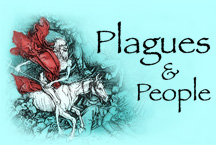
Infectious and Epidemic Disease in History
Department of History
University of California, Irvine
Instructor: Dr. Barbara J. Becker

Department of History
University of California, Irvine
Instructor: Dr. Barbara J. Becker
Supplementary readings for Week 3's lectures include:
Because of the vast extent of Alexander's empire, the rich legacy of Greek ideas on the "what," "why," and "how" of the physical world reached learned people throughout the Mediterranean and as far east as the Indus Valley. Thanks to productive schools and translation centers established throughout the region, Greek thought continued to guide and influence the work of curious investigators for centuries after the empire's dissolution. Individuals attempting to untangle the complexities of the organic world relied on the age-old authority of Aristotle, Hippocrates and Galen augmented by the insight found in Avicenna's highly respected works. By the 17th century, English-speaking readers unschooled in Latin could refer to a variety of medical handbooks such as The Regimen Sanitatis Salernitanum, a compilation of easy to remember and recite aphorisms presumably hailing from the faculty of one of the most prestigious medical schools in Europe, and The Pisse-Prophet Lectures by Thomas Brian.
|
 |
| Go to: |
|